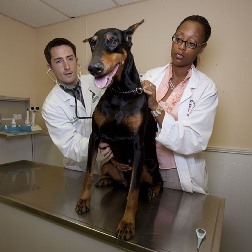How to Enroll In a Vet Tech College in Alabama
 Fulfilling your long term aspiration of working with and caring for animals by enrolling in a vet program in Alabama may at first seem like a challenging undertaking. After all, you need to locate and enroll in a program that will provide the necessary training to ensure that you can be successful as a vet assistant, technician or technologist. But just how do you tackle analyzing and contrasting schools so that you can make the ideal choice? Many aspiring students begin their due diligence process by looking for schools that are close to their residences. After they have located some local schools, they find out which ones have the cheapest tuition and focus on those. Although expense and location are significant concerns when evaluating vet tech schools, they are by no means the only significant ones when making your evaluations. Qualifications such as internship programs and accreditation need to be considered as well. The main idea is that there are questions you should be asking the veterinary tech programs you are reviewing before you make a final decision. We have furnished several in this article in order to help get you started, but before we discuss them we’ll discuss the different roles of vet assistants and techs and the training options available.
Fulfilling your long term aspiration of working with and caring for animals by enrolling in a vet program in Alabama may at first seem like a challenging undertaking. After all, you need to locate and enroll in a program that will provide the necessary training to ensure that you can be successful as a vet assistant, technician or technologist. But just how do you tackle analyzing and contrasting schools so that you can make the ideal choice? Many aspiring students begin their due diligence process by looking for schools that are close to their residences. After they have located some local schools, they find out which ones have the cheapest tuition and focus on those. Although expense and location are significant concerns when evaluating vet tech schools, they are by no means the only significant ones when making your evaluations. Qualifications such as internship programs and accreditation need to be considered as well. The main idea is that there are questions you should be asking the veterinary tech programs you are reviewing before you make a final decision. We have furnished several in this article in order to help get you started, but before we discuss them we’ll discuss the different roles of vet assistants and techs and the training options available.
The Responsibilities of a Veterinary Technician and Assistant
 One of the first decisions that you will have to make is if you desire to train as a vet assistant, technician or technologist. Part of your preference may be predicated on the amount of time and money that you have to devote to your training, but the primary factor will most likely be which specialty appeals to you the most. What vet techs and assistants have in common is that they all work under the immediate direction of a licensed and practicing veterinarian. And even though there are numerous functions that they can carry out within the Alabama veterinary practice or hospital, they can’t prescribe drugs, diagnose ailments, or conduct surgeries. In those areas they may only provide support to a licensed vet. There are technicians and technologists that work outside of the typical veterinarian practice, for example for zoos, animal shelters or police departments. Let’s take a look at the responsibilities and education requirements for each specialization.
One of the first decisions that you will have to make is if you desire to train as a vet assistant, technician or technologist. Part of your preference may be predicated on the amount of time and money that you have to devote to your training, but the primary factor will most likely be which specialty appeals to you the most. What vet techs and assistants have in common is that they all work under the immediate direction of a licensed and practicing veterinarian. And even though there are numerous functions that they can carry out within the Alabama veterinary practice or hospital, they can’t prescribe drugs, diagnose ailments, or conduct surgeries. In those areas they may only provide support to a licensed vet. There are technicians and technologists that work outside of the typical veterinarian practice, for example for zoos, animal shelters or police departments. Let’s take a look at the responsibilities and education requirements for each specialization.
- Vet Assistants in almost all instances will have completed a structured training program, either as an apprentice or intern in a vet clinic or hospital, or by finishing a certificate program at a trade school or community college in Alabama. As the name implies, their job function is to assist the veterinarians and vet techs in the performance of their duties. Generally they are not involved with more complex undertakings, such as assisting with surgical procedures. Some of their normal responsibilities may include working at the front desk, cleaning and preparing examination rooms and equipment, or handling pets during exams.
- Vet Technicians receive more advanced training in contrast to assistants and usually earn a 2 year Associate Degree, preferably from an American Veterinary Medical Association (AVMA) accredited program. They are in a sense the veterinarian equivalent of medical nurses, since their basic job duty is to assist veterinarians with diagnosing and treating animal patients. Where they vary from vet assistants is that they are engaged in more involved activities, for instance assisting with surgical procedures or administering medication. All states presently require veterinary techs pass a credentialing examination for either licensing, registration or certification.
- Vet Technologists are comparable to veterinary technicians and essentially carry out the same work functions. They are mandated to obtain a Bachelor’s Degree in veterinary technology, which usually requires four years to complete. Therefore the only real difference between a vet technologist and a technician is the technologist’s more advanced level of education. But with an advanced degree comes more job options, higher salaries and possible management positions. They are additionally mandated to pass a credentialing examination for either licensing, registration or certification.
Veterinary technicians and technologists can specialize in areas such as anesthesia, internal medicine or urgent care. Many may obtain certification from the American Association for Laboratory Animal Science (AALAS) to work in laboratories or Alabama research facilities as well.
Veterinarian Online Degree Programs
 An alternative that may make sense for those with a busy lifestyle or who are working full-time while attending veterinarian school is to enroll in an online training program. Because the classes are offered through the internet, students can attend on their own timetable wherever a computer is available. The course of study is taught using several venues, including videos, slide shows and live streaming webinars. And since most vet technician and technologist degrees require clinical training, that portion can normally be carried out as an internship or work study program at a local Alabama veterinarian clinic or hospital. Distance learning, as it is also called, may in some instances decrease the cost of your education. Tuition and ancillary expenditures, such as for traveling and study materials, can be more affordable compared to more conventional classroom programs. Just make sure that the program that you select is accredited, either by the AVMA or another nationally recognized accrediting organization. With the online courses and the clinical training, everything is included for a complete education. So if you are disciplined enough to learn in this more self-reliant mode, an online vet technician or assistant program may be the right choice for you.
An alternative that may make sense for those with a busy lifestyle or who are working full-time while attending veterinarian school is to enroll in an online training program. Because the classes are offered through the internet, students can attend on their own timetable wherever a computer is available. The course of study is taught using several venues, including videos, slide shows and live streaming webinars. And since most vet technician and technologist degrees require clinical training, that portion can normally be carried out as an internship or work study program at a local Alabama veterinarian clinic or hospital. Distance learning, as it is also called, may in some instances decrease the cost of your education. Tuition and ancillary expenditures, such as for traveling and study materials, can be more affordable compared to more conventional classroom programs. Just make sure that the program that you select is accredited, either by the AVMA or another nationally recognized accrediting organization. With the online courses and the clinical training, everything is included for a complete education. So if you are disciplined enough to learn in this more self-reliant mode, an online vet technician or assistant program may be the right choice for you.
What to Ask Vet Assistant and Technician Degree Programs
 By now you probably have decided on which veterinary certificate or degree that you want to obtain, and if you intend to study online or attend a school on campus. Since there are an abundance of veterinarian community colleges, technical and vocational schools in Alabama as well as across the United States, you should ask some relevant questions to help narrow down your list of alternatives. As we discussed in our opening, many potential students start by focusing on location and the cost of tuition. But we have previously mentioned other important qualifiers, which include accreditation and internship programs. And naturally you need to select a school that offers the degree and specialty that you want to earn. These and other qualifications are covered in the list of questions that you should ask the vet assistant and technician schools that you are reveiwing.
By now you probably have decided on which veterinary certificate or degree that you want to obtain, and if you intend to study online or attend a school on campus. Since there are an abundance of veterinarian community colleges, technical and vocational schools in Alabama as well as across the United States, you should ask some relevant questions to help narrow down your list of alternatives. As we discussed in our opening, many potential students start by focusing on location and the cost of tuition. But we have previously mentioned other important qualifiers, which include accreditation and internship programs. And naturally you need to select a school that offers the degree and specialty that you want to earn. These and other qualifications are covered in the list of questions that you should ask the vet assistant and technician schools that you are reveiwing.
Is the Vet School Accredited? It’s essential that you make sure that the veterinary assistant or technician college you choose is accredited by a regional or national accrediting agency. As previously stated, one of the most highly respected is the American Veterinary Medical Association (AVMA). Vocational schools and colleges that are accredited by the AVMA have gone through a demanding review process that ensures you will obtain a quality education. Also, accreditation is essential if you are applying for a student loan or financial aid, since many programs are not obtainable for non-accredited programs. Last, having a certificate or degree from an accredited college is often a precondition for employment for many Alabama veterinary clinics and hospitals.
What is the Program’s Reputation? The vet vocational school or college and program you select should have an excellent reputation within the vet field. You can begin your due diligence by asking the colleges you are reviewing for references from the employers in their job assistance network. Other tips include checking with internet school rating websites and contacting the school’s accrediting organizations as well. You can ask the Alabama school licensing department if there have been any grievances or violations relating to your targeted schools. As a final pointer, phone some veterinary clinics that you may want to work for after you get your training. Find out what they think of your school choices. They might even suggest some programs not on your list.
Are there Internship Programs? The best means to get practical hands on training as a vet technician or assistant is to work in a medical setting. Ask if the schools you are considering have internship programs set up with local veterinarians, vet hospitals or clinics. Almost all veterinary medicine programs require practical training and many provide it by way of internships. Not only will the experience be invaluable regarding the practical training, but an internship may also help establish associations in the local Alabama veterinarian community and assist in the search for a job after graduation.
Is Job Placement Provided? Searching for a job after graduating from a vet assistant or technician college can be difficult without the assistance of a job placement program. To begin with, find out what the graduation rates are for the colleges you are considering. A lower rate might mean that the teachers were ineffective at teaching the syllabus or that a number of students were dissatisfied with the program and quit. Next, verify that the schools have a job placement program and find out what their placement rates are. A higher placement rate might mean that the Alabama college has an exceptional reputation within the vet community and has a considerable network of contacts for student placements. A lower rate could mean that the training is not highly thought of by employers or that the job placement program is ineffective at placing students.
How Large are the Classes? If the classes are larger, you may receive little or no individualized instruction from the teachers. Request from the Alabama schools you are researching what their class teacher to student ratios are. You may also want to sit in on a few classes (if practical) to monitor the interaction between teachers and students. Get evaluations from students relating to the quality of instruction. Also, speak with the instructors and find out what their backgrounds are as well as their approaches to teaching.
Where is the School Located? Okay, we already talked about location, but there are a couple of more points to consider on the topic. If you are planning to commute to your vet tech classes from home or work, you must make sure that the driving time fits into your schedule. For instance, driving during the weekend to investigate the route won’t be the same as the commute during rush hour traffic, especially if the Alabama college is located in or near a larger city. In addition, if you do opt to enroll in a school in another state or even outside of your County of residence, there may be increased tuition charges especially for state and community colleges. On the other hand, attending classes online may be an alternative that will provide you with more flexibility and decrease the need for travel.
Do the Classes Fit Your Schedule? And last, it’s imperative that you determine if the Alabama veterinary schools you are evaluating offer class times flexible enough to accommodate your schedule. For instance, many students continue working full time and can only go to classes on the weekends or in the evenings. Others might only be able to attend class in the morning or later in the afternoon. Make certain that the class times you need are offered prior to enrolling. Also, find out if you can make up classes that you might miss as a result of work, sickness or family issues. You may find that an online program is the best solution to fit your veterinary education into your active life.
Pick the Right Vet Technologist College in Alabama
Selecting the right veterinary technician college is an important first step to beginning a gratifying career delivering care and treatment for pets and livestock. Potential students thinking about veterinary assistant or tech schools must make their selection based on multiple key factors. Veterinary techs, assistants and technologists are employed in animal hospitals, veterinary clinics and animal shelters. They commonly take on administrative tasks and support the veterinarian with the animal patients when needed. As we have covered, it’s very important that you decide on a veterinary medicine program that is both accredited and has an outstanding reputation within the profession. This goes for online vet tech schools as well. By asking the questions included in our checklist for assessing schools, you will be able to narrow down your choices so that you can make your final selection. And by picking the right college, you can achieve your goal of becoming a veterinary technician, assistant or technologist.
